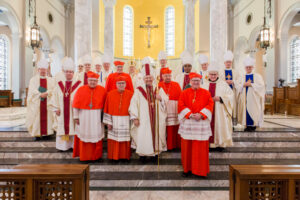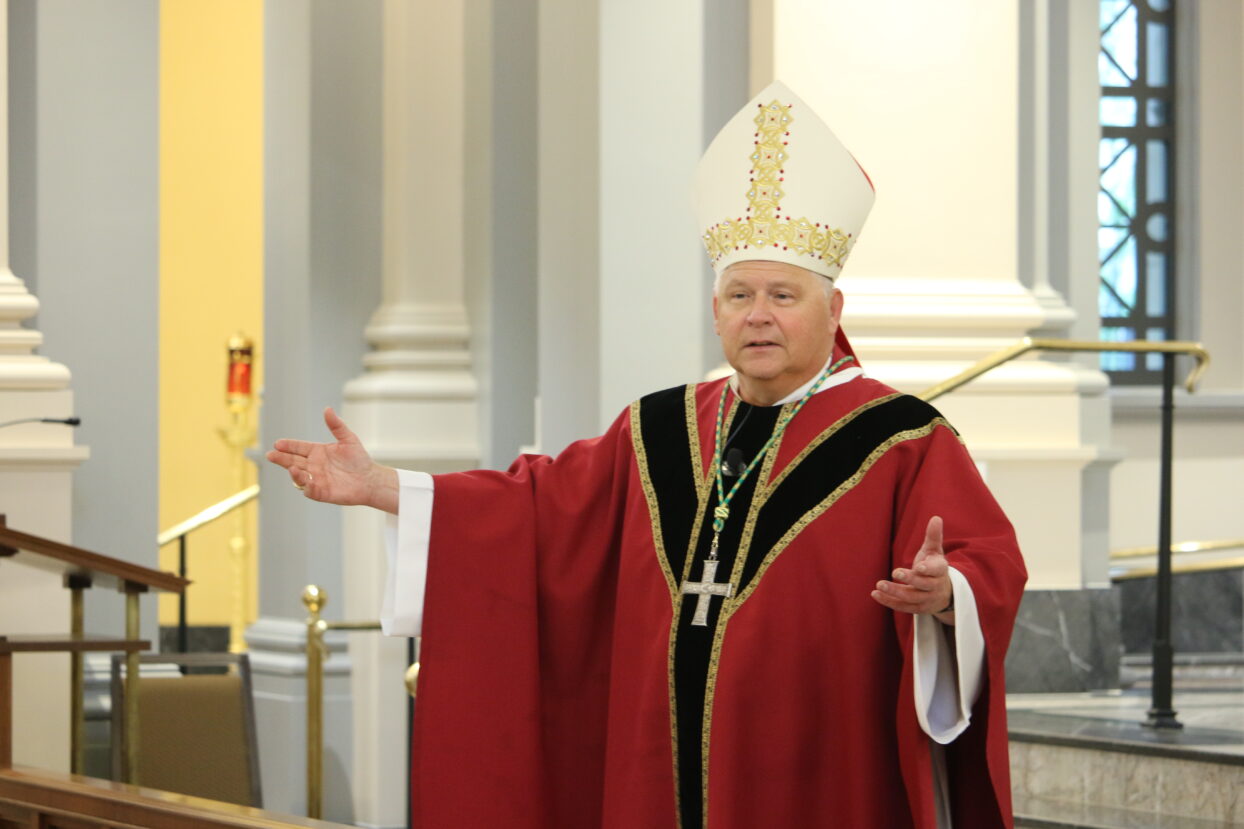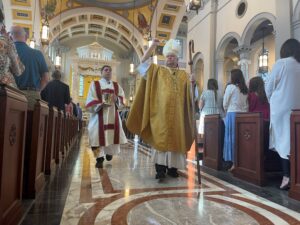Diocese’s 3rd shepherd taking emeritus status into early retirement
The East Tennessee Catholic
Bishop Richard F. Stika, the Diocese of Knoxville’s third and longest-serving shepherd, has resigned.

Richard F. Stika celebrates Easter Vigil Mass in April. The now-retired bishop announced his resignation on June 27. Photo by Dr. Kelly Kearse.
An announcement from the Vatican that Pope Francis granted Bishop Stika’s request to step down was made June 27 and then released by the U.S. Conference of Catholic Bishops. The bishop cited ongoing health concerns as a reason for his retirement.
“Pope Francis has accepted the resignation of the Most Rev. Richard F. Stika from the pastoral governance of the Diocese of Knoxville. At the same time, the Holy See has appointed the Most Rev. Shelton J. Fabre of Louisville as the Apostolic Administrator of the Diocese of Knoxville to serve until the appointment and installation of the new bishop,” according to the Holy See and the USCCB.
The resignation of Bishop Stika and the appointment of Archbishop Fabre were first publicized early June 27 in Washington, D.C., by Archbishop Christophe Pierre, apostolic nuncio to the United States.
Bishop Stika said he recently sent a letter to Pope Francis asking the Holy Father to grant his petition to retire as bishop of the Diocese of Knoxville. The bishop was appointed by Pope Benedict XVI on Jan. 12, 2009, and was installed on March 19, 2009.
“People will speculate on why I am doing this. I have been dealing with life-threatening health issues most of my adult life. I have been living with Type-1 diabetes since 1980. I nearly died from a diabetic coma in 2009, and as a result I lost vision in one of my eyes. I was hospitalized for another grave diabetic scare in 2015. I have survived a heart attack, heart bypass surgery, and I have four heart stents. I am also suffering from neuropathy. Last month, I was transported to a hospital in East Tennessee for another health issue,” Bishop Stika said.
“I recognize that questions about my leadership have played out publicly in recent months. I would be less than honest if I didn’t admit that some of this has weighed on me physically and emotionally. For these reasons, I asked the Holy Father for relief from my responsibilities as a diocesan bishop,” he added.
Bishop Stika, who turned 66 on July 4, now takes on the title of Bishop Emeritus, and he plans to return to his hometown of St. Louis to spend his retirement.
“God has blessed me abundantly. I have been a Catholic priest for most of that time, and I have tried my best to be a good shepherd. We have built and dedicated many new churches, including a much-needed cathedral, improved our schools, expanded care for the sick and vulnerable, and as always, I have tried to teach Jesus wherever I go,” Bishop Stika said.
“My desire is to remain in active ministry but at a slower pace. I would like to do so near my hometown, St. Louis, and continue to live with Cardinal Justin Rigali, whom I have known for almost 30 years and who has been in residence with me in Knoxville for 12 years,” he added. “I have tremendous love for East Tennessee. It has been my home for almost 15 years, and I plan to return often as Bishop Emeritus to visit friends, celebrate Masses when asked, and take in UT games.”
The former shepherd of the Catholic Church in East Tennessee believes God’s timing for the retirement announcement correlated to a verse in the Acts of the Apostles.
“While not intentional, I believe it’s not a coincidence that I made my decision (in May), during a time when our Scripture readings, found in Acts of the Apostles, focused on the turbulent growth of the Church. Reading Scripture is good. It reminds us that the Church isn’t perfect—it’s human, but it continues to grow in goodness, thanks be to God,” the bishop said. “I offer my genuine and heartfelt apology to anyone I have disappointed over the years. I have tremendous respect for everyone, even my detractors. I ask that you pray for Archbishop Fabre as he oversees this diocese in the short term and for your new bishop when he is selected. Finally, I humbly ask that you please pray for me.”
Bishop Stika has been the subject of recent news coverage involving two legal cases, one a civil case in Knox County involving a former seminarian, and the other a criminal case in Sevier County involving a priest accused of inappropriate conduct.
The cases have drawn the ire of individuals and groups protesting the Catholic Church’s response to those who have reported being abused by priests. The cases also have drawn the attention of secular and Catholic news media.
Archbishop Fabre, who was named by Pope Francis in March 2022 to lead the Archdiocese of Louisville, said he hopes to spend one to two days each week in the Diocese of Knoxville until Bishop Stika’s successor is in place.
The Archdiocese of Louisville is the seat of the metropolitan see of the Province of Louisville, which includes the dioceses of Knoxville, Nashville, Memphis, Covington, Ky., Lexington, Ky., and Owensboro, Ky., as well as the Louisville Archdiocese.
According to a statement from the Archdiocese of Louisville, Bishop Emeritus is the title the Diocese of Knoxville’s third shepherd will now go by.
In a message to the people of the Diocese of Knoxville, Archbishop Fabre asked for prayers for Bishop Stika as he assumes his new role. He also asked people in the diocese to “pray for an openness to the guidance of the Holy Spirit during this time of transition for the Diocese of Knoxville.”

Bishop Stika is joined by Cardinal Justin Rigali and fellow cardinals, bishops, and archbishops for the dedication of the cathedral in 2018.
“I offer gratitude to Bishop Stika for his 14 years of episcopal ministry. I extend to him my best wishes and prayers as he assumes his new role as Bishop Emeritus, or retired bishop. Please join me in praying for Bishop Stika, as we ask for his continued prayers for us,” Archbishop Fabre said.
The archbishop also asked the people of the diocese to keep him in their prayers and to pray for the priests, deacons, consecrated men and women, seminarians, and lay faithful in the diocese during the transition.
And he asked for prayers for the next bishop of Knoxville, who will oversee 50 parishes and one Catholic mission that serve some 70,000 Catholics in 36 East Tennessee counties.
During the transition, Archbishop Fabre expressed confidence that the Diocese of Knoxville will continue ministering to the people of God in East Tennessee every day as it has since it was established on Sept. 8, 1988.
“Together we will prayerfully address all the pastoral needs before us,” he said.
In the meantime, the Catholic faithful in East Tennessee await word from the Vatican on who will succeed Bishop Stika and become the Diocese of Knoxville’s fourth shepherd.
Archbishop Fabre said he hopes the Holy Father can name a successor sooner rather than later. But until then, the archbishop is putting in place plans to manage Catholic Church functions in East Tennessee.
“To ensure the spiritual and administrative needs of the Diocese of Knoxville are met in an efficient and appropriate manner, Archbishop Fabre’s appointment as apostolic administrator will last until Pope Francis names a new bishop of Knoxville and the bishop is installed. During his service to Knoxville, Archbishop Fabre will remain Archbishop of Louisville,” the Archdiocese of Louisville said in a statement released on June 27.
In a meeting with Diocese of Knoxville Chancery staff on June 27, Archbishop Fabre said he is appointing a diocesan priest to assist him in the daily activities of the diocese. He also indicated the naming of a new bishop could take several months.
On June 28, Archbishop Fabre named Father Doug Owens, pastor of All Saints Church in Knoxville and diocesan moderator of the curia, to be the delegate of the apostolic administrator.

Bishop Stika consecrates the altar at the just-renovated Basilica of Sts. Peter and Paul in Chattanooga.
When Bishop Stika arrived in East Tennessee in 2009, he succeeded then-Bishop Joseph E. Kurtz, who had been named by Pope Benedict XVI as archbishop of the Archdiocese of Louisville in June 2007.
In October 1999, Pope John Paul II named then-Monsignor Kurtz as the second bishop of Knoxville, succeeding Bishop Anthony J. O’Connell, who was the founding bishop.
Archbishop Fabre succeeded Archbishop Kurtz in Louisville in 2022 when Archbishop Kurtz retired.
Bishop Stika has led a growing Catholic population in East Tennessee and has dedicated a series of new churches, including the Cathedral of the Most Sacred Heart of Jesus, St. Albert the Great, and Church of Divine Mercy in Knoxville, St. John Neumann in Farragut, St. Michael the Archangel in Erwin, St. Teresa of Kolkata in Maynardville, St. John Paul II in Rutledge, and St. Christopher in Jamestown.
He helped break ground on construction of the new St. Alphonsus Church in Crossville, which is expected to be dedicated this year, led efforts to designate Sts. Peter and Paul in Chattanooga as a minor basilica as well as major renovations to the historic church building and rectory, and oversaw significant expansion and upgrades to the Christ Prince of Peace Retreat Center in Benton as well as to Knoxville Catholic and Notre Dame high schools and St. Joseph School.
He also brought the Religious Sisters of Mercy of Alma, Mich., the Evangelizing Sisters of Mary, the Handmaids of the Precious Blood, the Benedictines of Divine Will, and the Benedictine Daughters of Divine Will to the Diocese of Knoxville, where they join several members of the Dominican Sisters of St. Cecilia Congregation of Nashville.
As bishop, he oversaw establishment of the St. Mary’s Legacy Clinic ministry and creation of the Vietnamese Catholic communities in Knoxville and Chattanooga.
And one of his last projects was working with Catholic Charities of East Tennessee executive director Lisa Healy to complete major renovations to Catholic Charities’ Knoxville headquarters following a 2021 arson fire.
The Diocese of Knoxville is considered one of the dioceses in the country experiencing robust growth in Catholic population.



